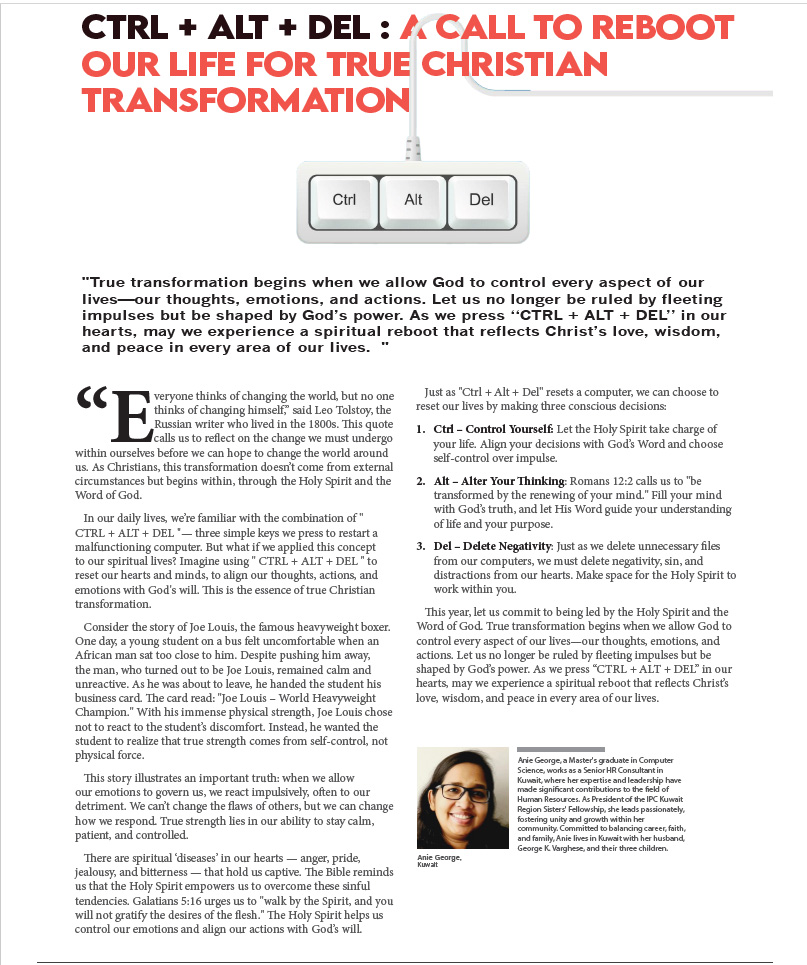Articles
8 common ways people interpret the Word of God

Throughout my years , I’ve delved deeply into hermeneutics, the science of biblical interpretation. In my view, no subject is more crucial for anyone seeking to understand the Scriptures. Hermeneutics is the key to unlocking the true meaning of the Bible, yet many believers are unaware of the “lens” through which they interpret it.
In this article, we’ll explore eight common approaches to interpreting Scripture.
1. Through the lens of truth from the Holy Spirit
Jesus promised His followers that the Holy Spirit would guide them into all truth, a promise reaffirmed by Saint John the Apostle (John 14:26; 1 John 2:27). This assurance, however, comes with a profound responsibility: the task of discerning, with the Spirit’s help, what the Word of God is truly conveying both individually and to the Church as a whole. This journey is not quick; it requires years of study and careful distinction between personal assumptions, cultural influences, and the Spirit’s divine insight.
2. Interpreting through the lens of culture
A widespread tendency is to interpret Scripture through the lens of contemporary cultural values, placing the Bible on par with the prevailing ethos of society. When this happens, people often approach Scripture primarily as a means to extract lessons that align with their cultural context. This approach, in my view, significantly diminishes the transformative power and divine intent of the Scriptures, reducing them to mere anthropological artifacts, literary works that are treated no differently than other texts esteemed by society’s intellectual elite.
3. The lens of truth for culture
This approach to interpretation focuses on using Scripture primarily for apologetics—to speak truth to contemporary culture. While there is undeniable value in this, it can fall short of Scripture’s deeper purpose: the pursuit of knowing God intimately and understanding His ways (2 Peter 3:18). The Bible certainly provides a comprehensive worldview that offers eternal principles relevant to politics, law, education, science, music, art, and culture. However, it is far more than a handbook for shaping societal norms, ideologies, or policies.
The ultimate aim of Scripture is not merely to inform nations’ governance but to transform individuals’ hearts. This should be the ultimate aim of all biblical interpretation, guiding us beyond cultural engagement to a life centered on communion with our Creator.
4. Through the lens of culture for faith
Many believers inadvertently read the Scriptures through the lens of their cultural values, interpreting biblical passages through frameworks like the American value system rather than through a purely biblical lens. While this is common, particularly among Christians in the USA, it’s essential to recognize that this approach is not unique to any nation. Christians worldwide often view the Bible through the lens of their own national cultures, whether African, Asian, Latin American, or otherwise.
Despite these cultural filters, God’s Word remains powerful enough to reach and transform lives, ministering to people even within the constraints of their cultural, emotional, mental, and historical contexts. However, as we grow in our faith, moving beyond these national frameworks becomes crucial. We must strive to read the Scriptures through a truly biblical lens, ensuring we do not impose our national values or worldview upon the sacred text.
5. Through the lens of a doctrine
Many Christians approach the Bible with a preconceived doctrinal bias, already committed to proving a particular theological framework before they even open the Scriptures. This mindset can severely limit one’s understanding of the text. For instance, a hyper-Calvinist might interpret every passage through the lens of God’s sovereignty, often downplaying or ignoring human responsibility. Conversely, an Arminian might focus so heavily on human free will that they overlook the significance of divine sovereignty.
To interpret the Bible accurately, we must resist the urge to impose our doctrinal assumptions onto the text. Instead, we should let the Scriptures speak for themselves, allowing their content to unfold naturally in the way and order they were written. Only then can we grasp the full depth and truth of God’s Word, free from the constraints of our own theological biases.
6. Through the lens of inward mystical truth
Some Christians, particularly those with a hyper-mystical bent, tend to overlook the literal, historical, and grammatical meaning of Scripture, choosing instead to interpret it solely through the lens of allegory and mysticism. For them, the plain text is merely a surface layer, obscuring what they believe to be a more profound, hidden spiritual meaning that the Holy Spirit reveals only to a select few.
While it is true that the Holy Spirit illuminates and reveals profound insights within the Scriptures, we must be cautious not to veer into subjective interpretations that disregard the fundamental principles of biblical hermeneutics.
To fully grasp its meaning, we must honor the text as it is written, allowing the Holy Spirit to guide us within sound interpretive practices. Only then can we avoid the pitfalls of mysticism that distort the Word of God and remain anchored in the truth it seeks to convey.
7. Through the lens of political activism
Over the past several decades, I’ve encountered books by so-called public theologians on the far left and popular preachers on the far right. Despite their opposing views, they share a troubling commonality: both engage in “proof-texting,” cherry-picking Scripture to support their political agendas while disregarding fundamental principles of biblical interpretation.
When the gospel is manipulated to serve political ends, it becomes entangled with the flawed and often corrupt systems of human governance that overshadow the message of Christ’s Kingdom, which transcends any earthly political framework.
8. Through the lens of moral principles
Many believers approach the Bible primarily as a devotional tool, seeking principles for business, leadership, purpose, and moral living. While the Scriptures indeed offer profound wisdom for these areas, reducing them to a mere guidebook for personal success is to miss their true essence.
The Bible is far more than a collection of practical tips; It is the living Word of God, revealing the all-consuming presence of a God who desires to engage with us. Through its pages, we are invited into a transformative encounter with Him through His Son, Jesus Christ, who is Lord of all.
To read the Scriptures for anything less than this is to view them through a human-centered lens, risking losing the Christ-centered focus at the heart of the sacred text. The ultimate purpose of the Bible is not just to enhance our lives but to draw us into a deeper relationship with the living God, where His grace and truth continually transform us.
Sources:Christian Post
http://theendtimeradio.com
Articles
CTRL+ALT+DEL: A call to reboot our life for true Christian transformation
Articles
7 ways we rebuild through Christ

When a person comes to Christ, it’s not just about being forgiven and waiting for heaven. Salvation is an ongoing process of regeneration where a person becomes a new creation, reshaped by the power of the cross. This process involves rebuilding every area of life according to God’s design. Today, we’ll explore seven key areas that are rebuilt in Christ.
1. Our personal life is no longer based on self
We are born in sin and naturally live according to the lusts of the flesh (Ephesians 2:1-3).
But in Christ, we begin to live a cross-shaped life, learning to deny ourselves and follow Jesus (Mark 8:34-36).
“And calling the crowd to him with his disciples, he said to them, ‘If anyone would come after me, let him deny himself and take up his cross and follow me’” (Mark 8:34-36).
The crucified life is a life where self is no longer at the center — God is. We are called to serve others, rather than live for self-gratification(Galatians 2:19-20).
We actually find our life when we lose it! We discover the best version of ourselves when we die to ourselves and allow Christ to live in us and through us.
2. Our families are shaped according to God’s Word
After coming to Christ, family life should be rebuilt and shaped by Scripture. One way is to disciple our children and teach them about God.
Psalm 78:5-7:
“He established a testimony in Jacob and appointed a law in Israel, which he commanded our fathers to teach to their children, that the next generation might know them, the children yet unborn, and arise and tell them to their children, so that they should set their hope in God.”
Furthermore, parents are instructed to raise their children according to the Word of God, ensuring that our homes reflect biblical values and generational faithfulness (2 Timothy 3:15-16).
3. We do business God’s way
The Bible teaches that work is not merely a means to provide for ourselves; it is an act of worship.
Genesis 2:15 illustrates that Adam was called to work even before he had a wife and children. It was an act of worship since, as His image bearer, he imitated the God who worked 6 days before He entered His rest.
“The LORD God took the man and put him in the garden of Eden to work it and keep it.”
Like Adam, we work because we are made in the image of a God who worked to create the world. In business, we walk in integrity, treat employees as partners, equip them to flourish in work, and prioritize honoring God. This means creating environments that reflect God’s kingdom values, including allowing people to worship on Sundays.
4. We use our wealth to spread the Kingdom
Deuteronomy 8:18 reminds us that God gives us the ability to produce wealth, not just for personal gain, but to advance His Kingdom. As believers, we are called to steward our finances in a way that reflects God’s mission, investing in the expansion of the gospel, meeting needs, and helping to establish justice and mercy on earth.
Money is not evil, but the love of money is evil. Money can also be used to advance the kingdom.
I.E., God was able to use “The Good Samaritan” because he had wealth (Luke 10).
God used Joseph of Arimathea who buried the body of Jesus because he had financial resources.
God used Lydia, who had her own business and started a church because she owned a home and was a business owner (Acts 16).
5. We are called to reflect Christ by serving our communities
Titus 2 and 3 show us that we are not just called to serve within the walls of the church, but to be profitable to all people.
2:7 says “Show yourself in all respects to be a model of good works …”
2:14 says Jesus purified people “who are zealous for good works.”
3:14 says “let our people learn to devote themselves to good works …”
This means our communities should see the light of Christ through our good works.
History is replete with how Christ’s followers have rebuilt cities and nations and served humanity in a way that forever impacted nations.
Isaiah 61:4 says:
“They shall build up the ancient ruins; they shall raise up the former devastations; they shall repair the ruined cities, the devastations of many generations.”
6. The Church is called to reparent and rebuild individuals
Jesus’ invitation to “follow me, and I will make you …” demonstrates the Church’s role in rebuilding lives (Matthew 4:19). Through biblical discipleship, we help people discover their God-given purpose and destiny.
Discipleship is more than instruction; it’s walking with people to see them transformed and equipped to fulfill their calling in Christ.
Jesus didn’t say, “follow me and I will give you a weekly bible study. He gave people the opportunity to do life with Him, which created the environment to make disciples and bring about personal transformation.
7. The Church participates in the renewal of all things in Christ
God called Adam to bring His influence on the whole earth.
Genesis 1:28. God’s ultimate plan with and through the church participating with Jesus is to renew all things through Christ (Ephesians 1:9-11). We are not just waiting for the second coming; we are active participants in the restoration of creation through the gospel. As we live in alignment with God’s kingdom, we anticipate the fulfillment of this promise in the climax of history with a new heaven and new earth (Revelation 21:1-8).
Five practical takeaways
1. Embrace daily denial of self: Evaluate your life and ask where you need to surrender personal desires in favor of following Christ. This is the first step toward living a cross-shaped life.
2. Create a family discipleship plan: Begin setting time aside weekly to disciple your children or encourage your family members in the Word of God. Make your home a center for spiritual growth.
3. Work with integrity and purpose: Consider how your work can reflect God’s glory. Are you treating your employees or coworkers with dignity and empowering them, or are you merely using them to get your work done?
4. Be a faithful steward of wealth: Make a decision to invest in Kingdom causes. Pray about where your resources can make a Gospel-centered impact — supporting missionaries, funding outreach, or caring for the poor.
5. Serve your community: Identify a way to serve your community this week. Whether it’s through volunteering, meeting a need, or simply being present in a meaningful way, show Christ’s love in action.
As we participate in this process of rebuilding, God transforms us, our families, our work, and, ultimately, the world around us. Let us surrender fully to Christ and trust Him to rebuild every aspect of our lives for His glory.
Sources:Christian Post
Articles
God’s peace and the world’s peace are not the same

Peace is not just a feeling, it is also a condition, a mindset, a state of being. It is a relationship with God Almighty who created you and loves you. Peace is where we want to live. But we live in an unpeaceful world full of strife, envy, jealousy, rage, competition, anxiety, fear, worry, and yes lust. We crave what we don’t have, and we don’t want what we do have. We long for peace.
The peace of God is the opposite of all that the world has to offer.
The world’s definition of peace is a state of tranquility, freedom from disturbance, and harmony in personal relations.
Who doesn’t want that?
Now listen to the story of Jesus and the peace He offers you and me.
“And the angel said to them, ‘Fear not, for behold, I bring you good news of great joy that will be for all the people. For unto you is born this day in the city of David a Savior, who is Christ the Lord. And this will be a sign for you: you will find a baby wrapped in swaddling clothes and lying in a manger.’ And suddenly there was with the angel a multitude of the heavenly host praising God and saying, ‘Glory to God in the highest, and on earth peace among those with whom he is pleased!’” (Luke 2:10).
Jesus comes to give peace!
Now you may think you know what peace is. But listen to what Jesus says about it,
“’Let not your hearts be troubled. Believe in God; believe also in me. In my Father’s house are many rooms. If it were not so, would I have told you that I go to prepare a place for you? And if I go and prepare a place for you, I will come again and will take you to myself, that where I am you may be also. And you know the way to where I am going.’ Thomas said to him, ‘Lord, we do not know where you are going. How can we know the way?’ Jesus said to him, ‘I am the way, and the truth, and the life. No one comes to the Father except through me’” (John 14:1).
Look at what Jesus also says in John 14:27: “Peace I leave with you; my peace I give to you. Not as the world gives do I give to you. Let not your hearts be troubled, neither let them be afraid.”
Jesus is the way to peace. And you may say, “Oh, I know what peace is!” But you don’t. You don’t know what peace is until you know Jesus. His peace is not like the world’s peace.
If you know Jesus, you will experience peace. If you don’t know Jesus, you won’t. Not in any real sense, that is.
The peace of God is a state of wholeness, calmness, and completeness.
As you compare the two definitions, the world’s definition of peace is an external definition based off circumstances and human relationships.
If you are trying to get to a permanent condition of peace based off external circumstances and human relationships, you are going to be more unpeaceful than you are now. The peace the world offers you is circumstantial. The peace God offers you is complete, consistent, whole, and perfect regardless of what is going on in your life. It doesn’t come from without, it comes from within.
Let me explain. When Jesus returned to Heaven he promised to send the Holy Spirit.
“These things I have spoken to you while I am still with you. But the Helper, the Holy Spirit, whom the Father will send in my name, he will teach you all things and bring to your remembrance all that I have said to you”(John 14:26).
The Greek Word here is Paracletos, “the one who comes along side” or the Comforter. The Peace giver! Jesus left earth and sent the Holy Spirit to live inside of us. Now look at the fruit of the Spirit that lives inside you:
“But if you are led by the Spirit, you are not under the law. Now the works of the flesh are evident: sexual immorality, impurity, sensuality, idolatry, sorcery, enmity, strife, jealousy, fits of anger, rivalries, dissensions, divisions, envy, drunkenness, orgies, and things like these. I warn you, as I warned you before, that those who do such things will not inherit the kingdom of God. But the fruit of the Spirit is love, joy, peace, patience, kindness, goodness, faithfulness,23 gentleness, self-control; against such things there is no law” (Galatians 5:18).
How do we unwrap God’s gift of peace in our lives? You and I must accept Jesus as God’s peace to the world. We must realize the world’s peace and God’s peace are not the same. True peace comes when we follow Jesus and not our own wishes or wants.
I don’t have to be worried because Jesus is my peace. I don’t have to be jealous because Jesus is my peace. I don’t have to be angry because Jesus is my peace. He has sent the Holy Spirit to live in me. I just need to keep in step with Him as He leads me into the peace He has for me in Jesus’ name.
Sources:Christian Post
-

 Travel9 months ago
Travel9 months agoയാക്കൂസ കരിഷ്മ:ഓല സ്കൂട്ടറിനേക്കാൾ വിലക്കുറവിൽ കുഞ്ഞൻ കാർ; സിറ്റി യാത്രകൾക്ക് ഇനി ഇവൻ മതിയാവും
-

 Movie3 months ago
Movie3 months agoFor KING + COUNTRY Stars’ Big Plan to Bring Message of Jesus, ‘Redemption of Humanity’ to People Across America
-

 National12 months ago
National12 months ago300,000-Member Indian Church to Plant 40 More Megachurches
-

 National12 months ago
National12 months agoനെയ്തേലിപ്പടി ക്രൂസേഡിന് അനുഗ്രഹീത സമാപ്തി
-

 Tech8 months ago
Tech8 months agoചിത്രങ്ങൾ എഡിറ്റ് ചെയ്യാം; വാട്സ്ആപ്പിലെ ‘നീല വളയം’ സ്മാർട്ടാകുന്നു, കാര്യമായ മാറ്റങ്ങൾ
-

 Movie3 months ago
Movie3 months agoFor KING + COUNTRY Stars’ Big Plan to Bring Message of Jesus, ‘Redemption of Humanity’ to People Across America
-

 Movie11 months ago
Movie11 months agoActor Ryan Phillippe ‘Craving’ Relationship With God After Movie About Christian Missionary
-

 Articles9 months ago
Articles9 months ago8 ways the Kingdom connects us back to the Garden of Eden


























